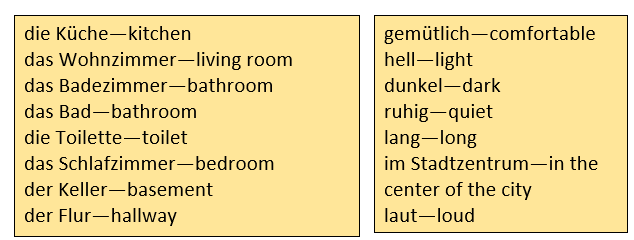30 Section 3-6: Wissen vs. kennen
3.6: Wissen vs. kennen
In chapter 2, you learned the verb kennen, to know or to be familiar with. We use this verb to talk about knowing people or being familiar with a film, city, or movie.
A: Kennst du meinen Mitbewohner?
B: Nein, ich kenne ihn nicht.
A: Aber du kennst den Film Goodbye Lenin, oder?
B: Ja, natürlich kenne ich ihn!
A: Mein Mitbewohner war in einer Szene im Film.
This conversation was about knowing a person and being familiar with a film. Therefore, we can use the verb kennen here.
In German, there are two verbs that mean “to know.” The second of these, wissen, is used to talk about knowing facts.
Wir wissen die Antwort.
Ihr wisst, wo wir wohnen.
Wissen Sie, wann der Film beginnt?
Knowing the answer or where someone lives or when a film begins are all facts. Therefore, we use wissen instead of kennen.
Wissen is also slightly irregular and has the exact same pattern as modal verbs; the left side of the conjugation is irregular, but the right-hand side is completely normal.

If you can remember the pattern of the modal verbs, it will be easier to learn the conjugation of wissen.
THE GOOD NEWS—this is the last irregular verb in present tense in the German language! From here on out, they are all regular.
Beispiele: wissen (fact) oder kennen (familiar with)?
A: Kennst du meine Schwester?
(Knowing a person, being familiar with person)
B: Ja, ich kenne sie schon lange.
(Knowing a person, being familiar with person)
A: Sie wohnt in Stuttgart. Kennst du die Stadt?
(Being familiar with city)
B: Nein, nicht so gut, aber ich weiß, wo Stuttgart liegt.
(Knowing where the city lies, is a fact.)
A: Ich weiß, sie vermisst dich. Du sollst sie irgendwann mal besuchen.
(Knowing that she misses the person is a fact.)
B: Ich weiß ihre Adresse nicht.
(Knowing an address is a fact.)
HINT: If the sentence has a comma and what looks like another sentence after it, it’s probably “wissen.” i.e. Sie wissen, was die Kinder machen.
SUMMARY:
- kennen = to know (a person); to be familiar with (a city, a book, a film, etc.)
- wissen = to know a fact (conjugated like a modal verb)

Click to see me reteaching wissen vs. kennen.
Watch YourGermanTeacher’s short video to see another recap:
Watch German Online Gym’s video to see a detailed explanation of wissen. The second video goes into detail on kennen.
Ex. B: Übersetzen Sie ins Deutsche!

- I don’t know where you live.
- We know his grandparents.
- Do you know when the movie begins?
- I know, it begins tomorrow, but I don’t know when.
- Are you familiar with Canada?
- Do you know Beyonce?
- I don’t know her personally, but I know who she is.
- Who knows the answer?
- A: You’re not healthy. B: Yes, I know (it).
EXTRA PRACTICE: For extra practice conjugating wissen, go to Germanzone.org’s site and do the exercise. The website will grade your answers.
Listen to Nena’s hit song, Du kennst die Liebe nicht, (1985), to hear examples with the verb kennen.
Songtext: https://genius.com/Nena-du-kennst-die-liebe-nicht-lyrics
Ex. C: Nicos Weg. Episode 26: Meine Wohnung. Watch the video and do the online activities associated with it. You will learn vocabulary for rooms of the house and how to describe your own house.

https://learngerman.dw.com/en/meine-wohnung/l-37425763


Ex. D: Alles über Ihr Haus! Beantworten Sie die Fragen in ganzen Sätzen.
- Haben Sie ein Haus oder eine Wohnung?
- Wie viele Zimmer hat Ihr Haus oder Ihre Wohnung?
- Wohnen Sie in der Stadt oder auf dem Land?
- Haben Sie einen Balkon?
- Haben Sie einen Flur?
- Wie viele Badezimmer haben Sie?
- Welche Zimmer gibt es in Ihrem Haus oder in Ihrer Wohnung?
- Beschreiben Sie Ihr Schlafzimmer. Die Küche. Das Wohnzimmer. Das Bad. Den Keller.
Ex. E: Beschreiben Sie Ihr Haus oder Ihre Wohnung! Schreiben Sie einen kurzen Absatz über Ihr Haus oder Ihre Wohnung. Haben Sie Probleme? Benutzen Sie die Fragen in Übung D.

